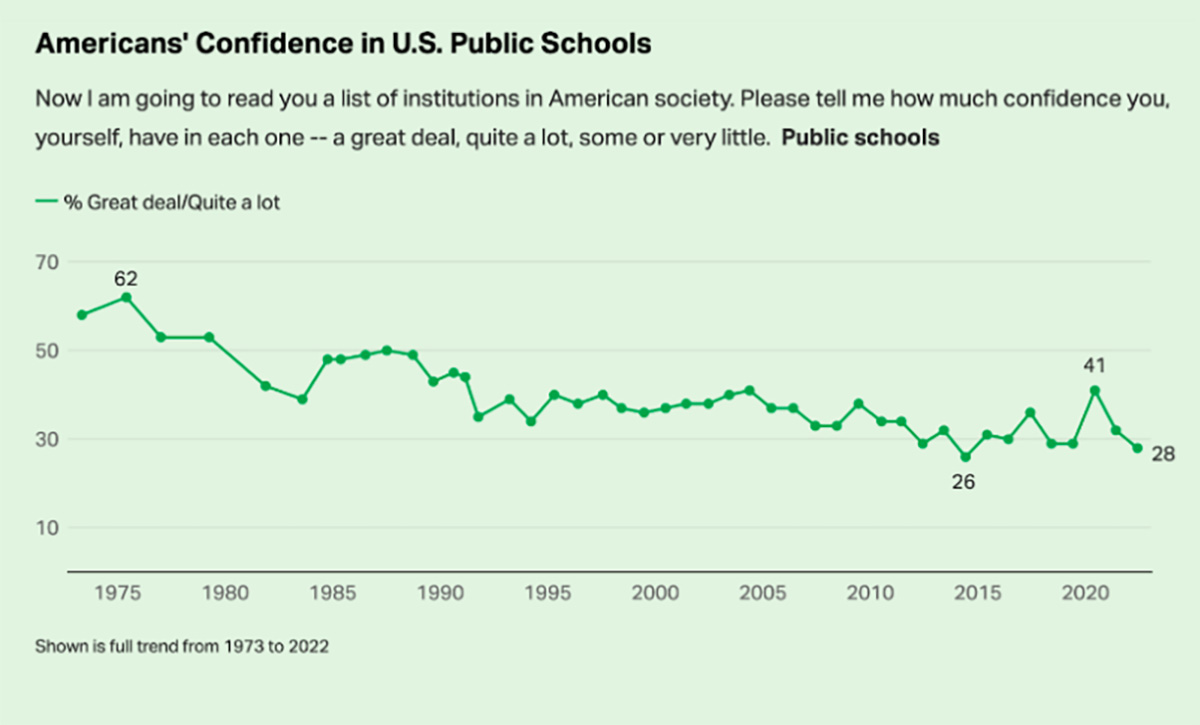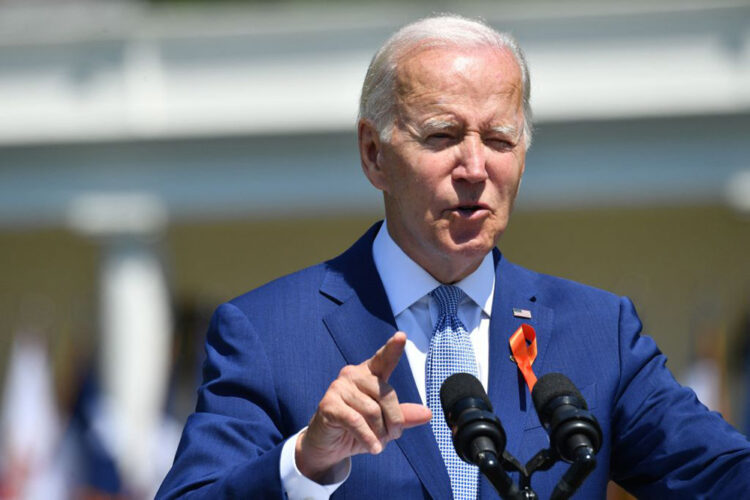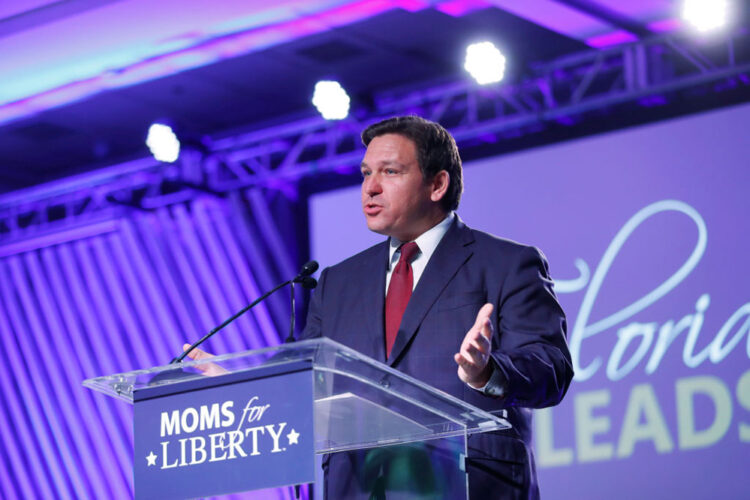Rash of New Polls Raises Red Flags for Democrats on Education
As confidence in public schools wanes, voters gravitate toward conservative classroom policies and see Democrats as out of touch

Help fund stories like this. Donate now!
Less than four months before the 2022 midterm elections, the electoral prospects facing Democrats grow dimmer by the week, with President Biden’s approval rating slumping dangerously and many hoping he declines to run for a second term. In another ominous sign, new polls — including several commissioned by Democratic allies — suggest that the party is losing credibility on K-12 schools, an issue it has long dominated.
The polls were released by interest groups representing opposite ends of the center-left public policy spectrum: Democrats for Education Reform (DFER), an organization traditionally supportive of school choice and standardized testing, and the American Federation of Teachers (AFT), the nation’s second-largest teachers’ union. But both point to an electorate that is increasingly skeptical of the Democratic education brand and open to Republican counter-proposals.
The DFER survey, conducted by Impact Research in late June and early July, queried 800 likely voters scattered across 62 hotly contested congressional districts where control over the House of Representatives will likely be decided this fall. Participants were asked to respond to a series of education-related messages, rank different policy priorities, and rate various political figures according to favorability.
While several anti-GOP messages seemed to sway the minds of respondents, such as attacking conservatives for censorship in the classroom and voting against higher teacher pay, the overall picture was bleak. Forty-seven percent said they trusted Republicans to handle public education today, compared with just 43 percent who trusted Democrats. And the numbers grew worse among parents, who favored Republicans by nine points.
That pronounced flip in traditional preferences — for decades, public opinion research has shown liberals winning the messaging war on education — seems to be driven by a widely held view that Democrats aren’t concentrating on the education issues that most concern voters. Two-thirds of respondents to the DFER poll said they wanted politicians to focus on helping American students recover from COVID-related learning loss rather than managing how subjects like race are taught in the classroom (a varied controversy often grouped under the term “critical race theory,” or CRT). But by a 54-26 margin, they also said they believed that Democrats had those priorities reversed.

Matt Hogan, a partner at Impact Research, said that it was striking to see Republicans seize an edge on an issue that “has historically been one of the Democrats’ strengths.”
“There’s just a perception that Democrats’ focus on education is not where voters want it to be, which is helping kids make up the ground they lost,” Hogan said. “They think both parties are too focused on race and gender issues in schools, rather than focusing on catching kids up — but notably, they think that is true of Democrats even more so than Republicans.”
The bleeding even extends to constituencies that have traditionally been some of the most steadfast Democratic voters. Asked which party should control Congress, African American and Latino participants only gave Democrats a five-point lead; such tepid support could translate into dozens of lost seats on Election Day.
Black, Latino, and Asian voters were all somewhat more likely to vote Republican in 2020 than they had been in previous elections, and each group tends to rate K-12 education as a higher priority than do white voters.
“The underperformance among voters of color is not new this cycle, unfortunately,” Hogan observed. “And given their greater emphasis on education issues, I think it makes it even more important that Democrats get their messaging right to make up the ground they’ve lost.”
But the problem isn’t as simple as voters drifting away from Democrats. The AFT survey suggests that they may actively be gravitating toward GOP positions as November draws near.
The poll, conducted by Hart Research in May, showed a similar, though smaller Republican advantage on education (39-38) among voters in seven states with competitive elections this year. And while not specifically naming firebrand Florida Gov. Ron DeSantis, the poll clearly indicated that respondents in some of the biggest 2022 battlegrounds are receptive to the arguments the Republican has made nationally.

By a 32-point margin, participants said they would favor candidates who supported teaching less about race and more about core subjects like math and reading. Sizable majorities also said they favored banning trans athletes from competing in girls’ athletic competitions, and banning teaching about sexual orientation and gender identity from kindergarten to third grade.
The latter policy — dubbed by its detractors as “Don’t Say Gay” — was controversially adopted by Florida this spring at DeSantis’s urging. Other recent polls show that large minorities of classroom teachers are uncomfortable teaching aspects of LGBTQ history.
The poll was commissioned ahead of a renewed campaign by the AFT and its allies to reframe the conversation around education policy. As longtime leader Randi Weingarten forecast at a national gathering held last week, the union will seek to highlight Democrats’ efforts to help schools fully recover from the pandemic, alongside Republicans’ interventions in cultural politics.
David Paleologos, the lead pollster for Suffolk University, said the damage sustained by Democrats on newly controversial issues like curriculum and classroom instruction was at least partly self-inflicted. As with the ongoing clash over various proposals to defund the police, he argued, Democrats’ education messaging has sometimes lapsed into the self-destructive.
“The slick packaging of ‘CRT’ and ‘Defund the Police,’ backfired, and the Democratic Party lost more independents and even some young parents, who were traditional Democratic voters,” Paleologos said. “A more thoughtful descriptor may have changed the narrative with both key demographics.”
Neither K-12 schools nor public safety are typically the pivot points around which national elections turn, noted Jack Jennings, a former longtime Democratic education staffer in the U.S. House. Instead, he described education as a “generic issue,” perceptions of which are heavily colored by the “mood of the times” — in this case, a dark mood.
“What’s depicted in the press as the failure of public schools will have some effect on Democrats, but it won’t be the deciding factor,” said Jennings, author of the recent book Fatigued By School Reform. “It’ll more likely be inflation, the cost of gas, that type of issue.”
‘An erosion of trust’
But even if school performance is rarely central to voters’ choices in the voting booth, newly diminished trust in the party could affect Democrats’ efforts to lead a post-COVID learning recovery for millions of students. And at the same time that voters are turning away from Democratic messages, they also seem to be souring in their general perceptions of schools.
According to the latest numbers from a longtime Gallup tracking poll, the public’s faith in American K-12 schools is approaching a record low. Data released last week showed that just 28 percent of respondents had “a great deal” or “quite a lot” of confidence in public schools.
That figure surged to 41 percent in 2020, as the COVID-19 pandemic was first shuttering schools and disrupting learning. But while more than two-fifths of Democrats still hold a high assessment of school performance, only 14 percent of Republicans now say they have much confidence in the education system. Independents are directly in the middle, with 29 percent.
Jennings said that the downturn in public opinion was to be expected given the stream of bad news around education.
“All parents are hearing are negative things about their schools: They’re hearing about COVID, they’re hearing about budget imbalances, and now they’re hearing about teachers leaving or wanting to leave [the profession]. So the schools have a series of problems, and that’s reflected in the results.”
Polarized views of public services are nothing new — Democrats have historically voiced the highest opinions of American schools. But Paleologos argued that party leaders’ strong support for educators and school districts, even throughout the chaos of prolonged closures and substantial learning loss, has led a jaded public to begin tuning them out.
“The basis for this turnaround was an erosion of trust in school administration at all levels, where young parents — once confident in the decisions of their school systems — were questioning every policy decision from their school committees to their classrooms,” he said. “And the loyal backing of teachers and administrators by Democratic politicians has now put these young parents on the opposite side of them, resulting in one windfall beneficiary: the Republican Party.”
Help fund stories like this. Donate now!

;)
